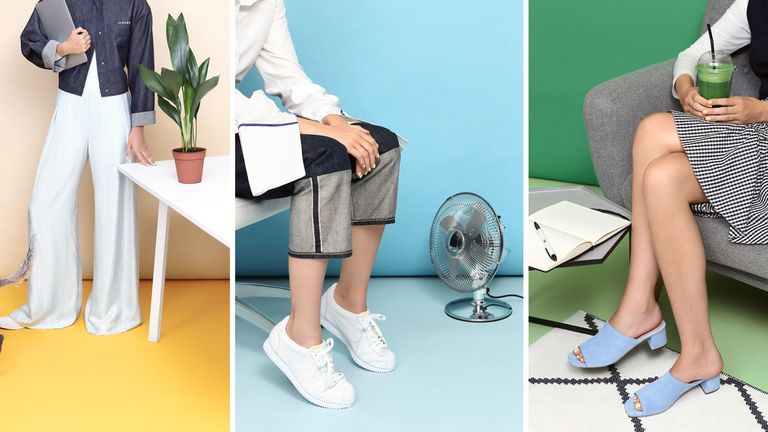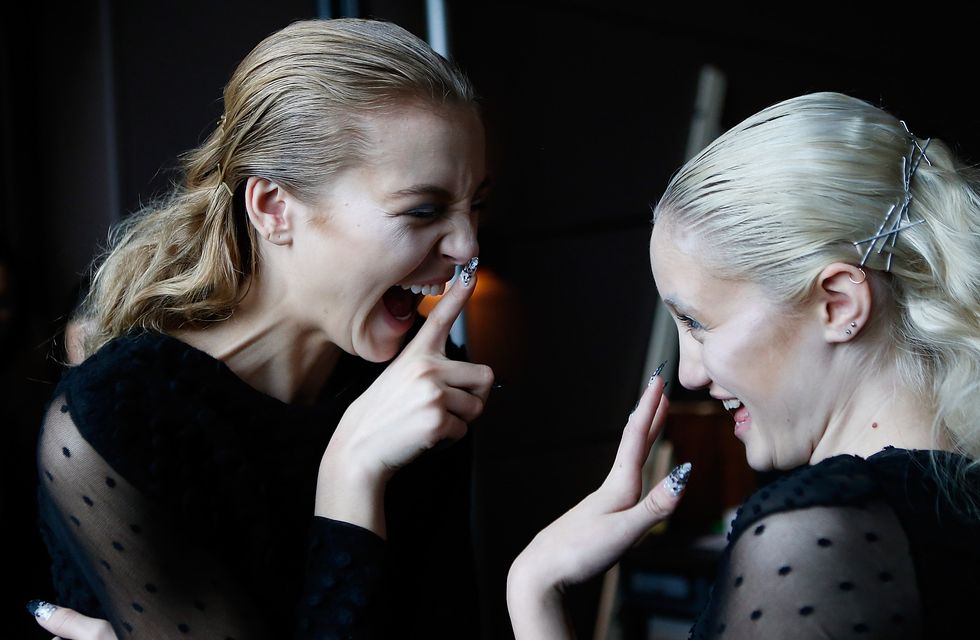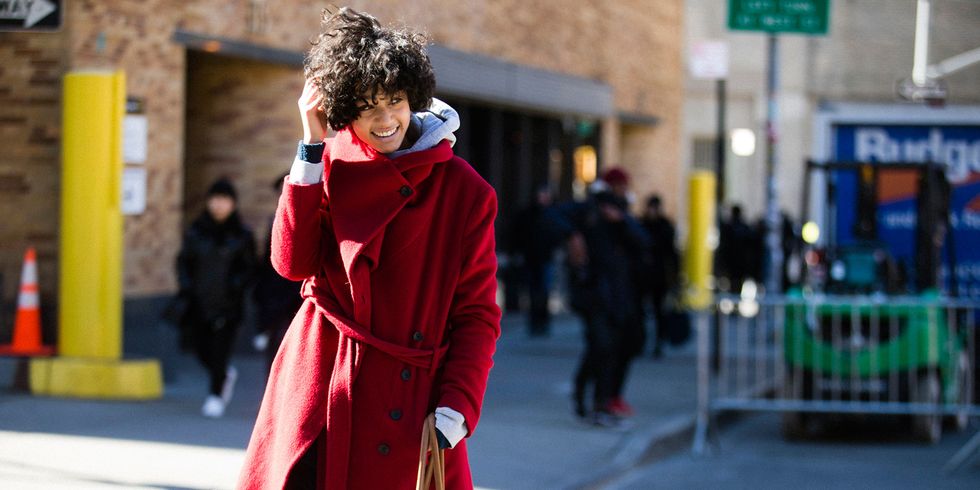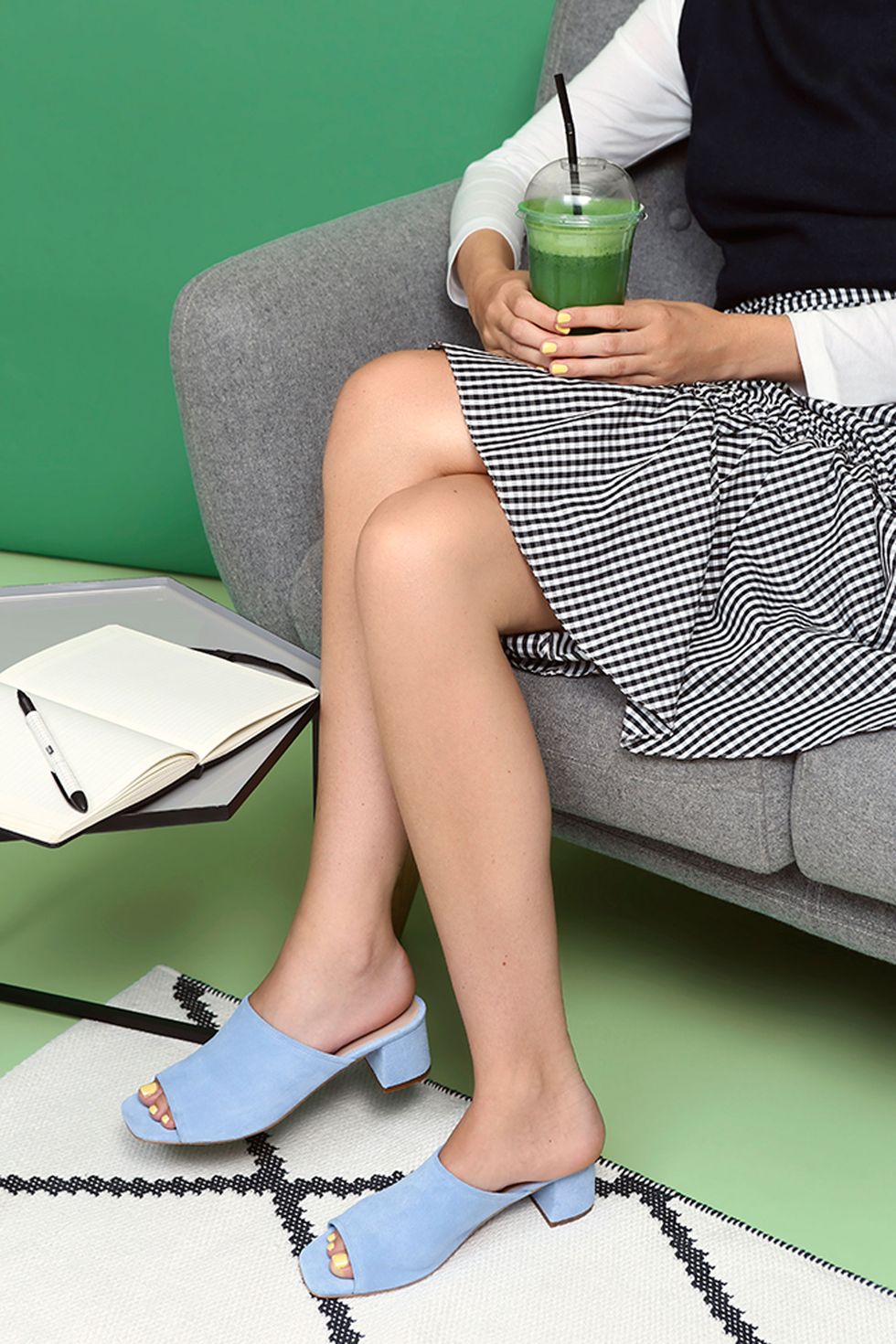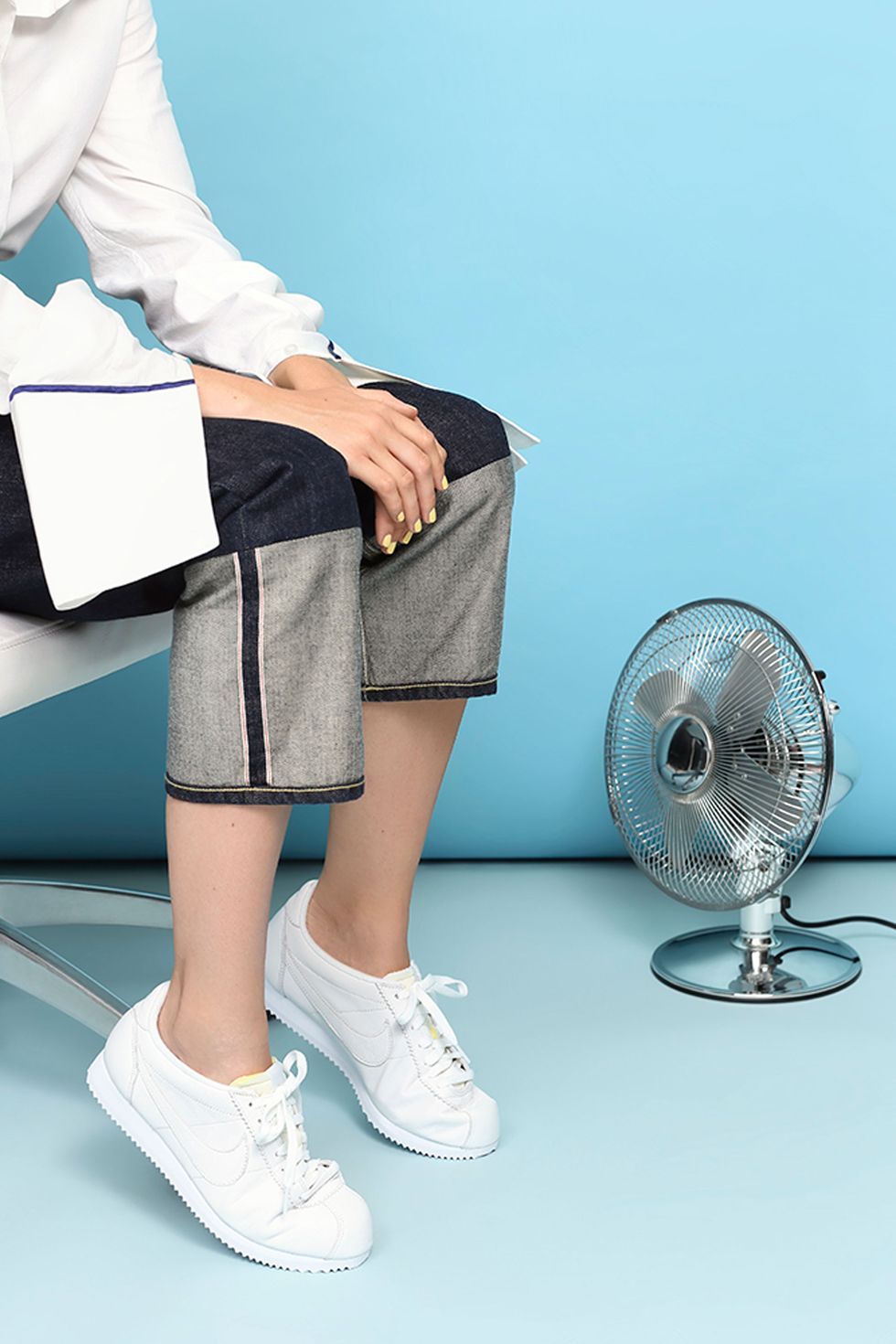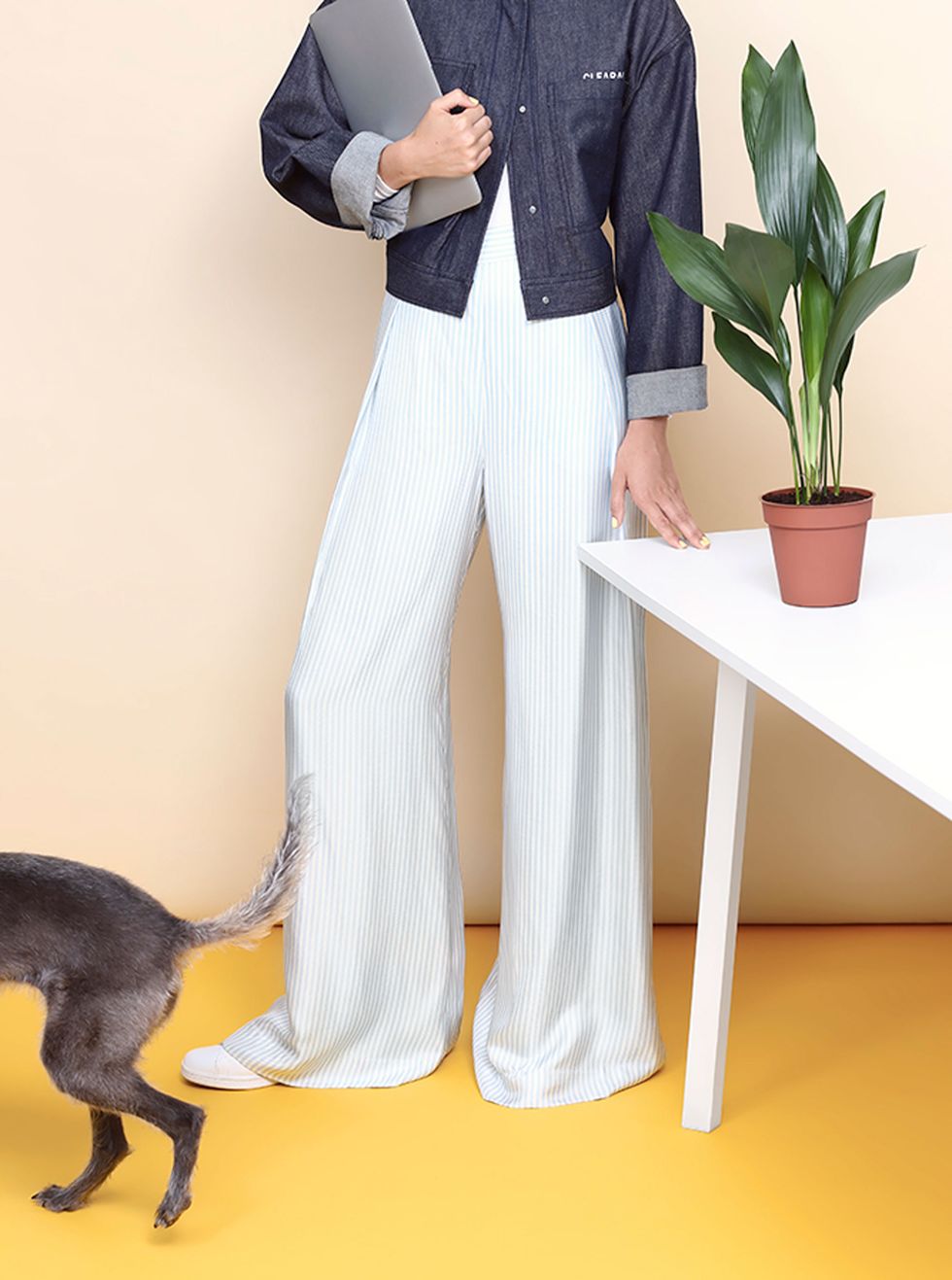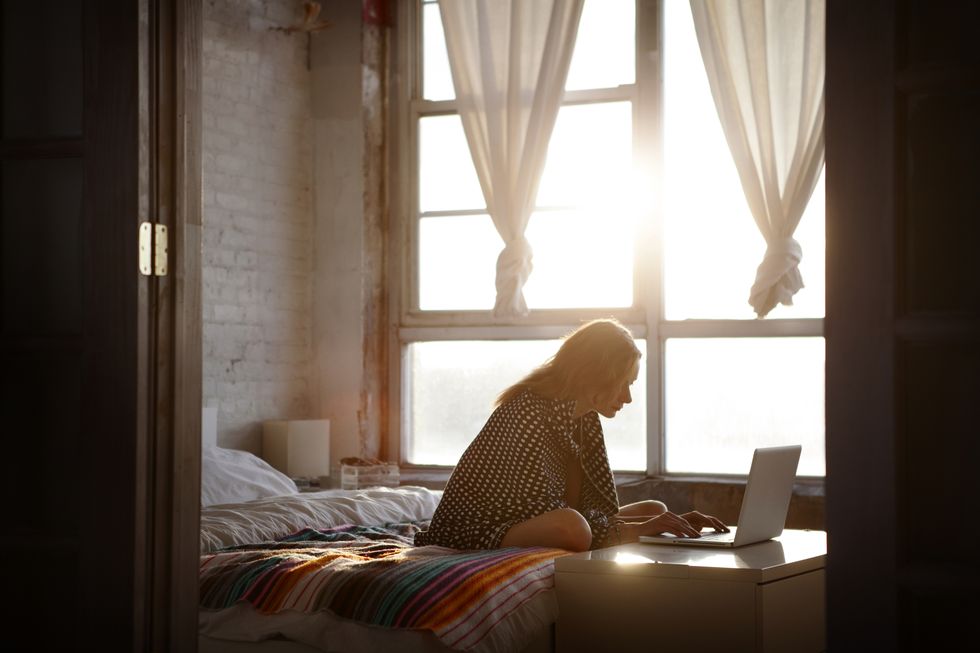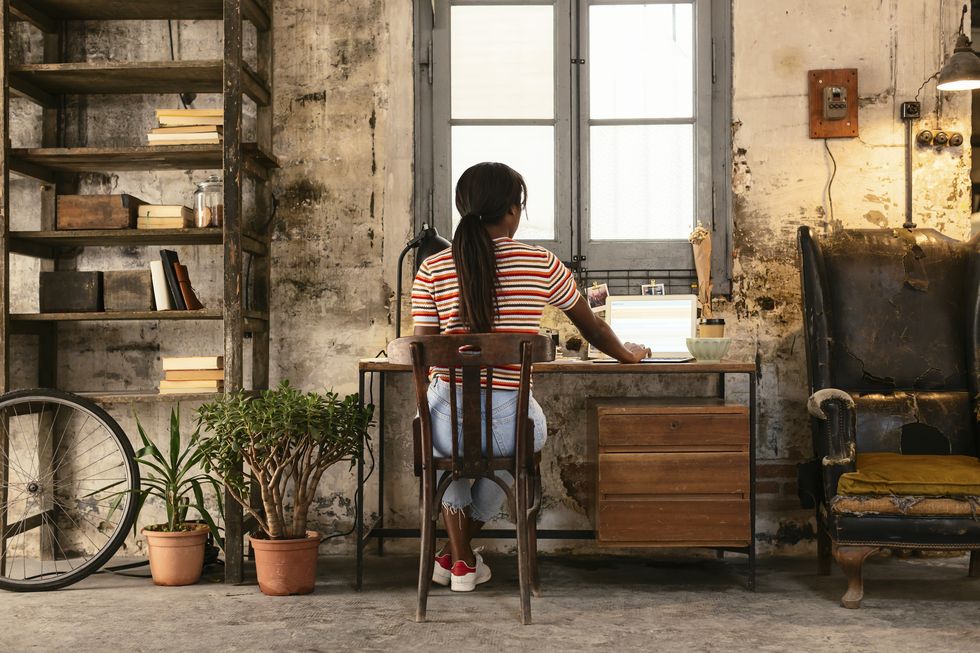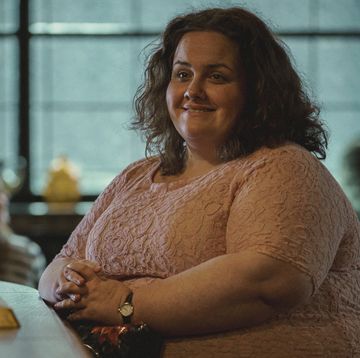How was your day? If you're feeling anxious, restless and your days spent working from home are blurring into one, don't despair.
Many of us are used to occasionally working from home, but usually this is because we have chosen to. Now, control over that choice has been taken away from us, which means we have to reclaim that control somewhere else.
Based on the opinions of women dominating their careers, from psychologists through to authors – including those who worked from home pre-isolation – the formula for WFH happiness depends on forming clear routines.
It can mean setting a unique schedule, cleaning your house, or simply washing and dressing for work as normal, instead of slouching around in tracksuit bottoms and loungewear all day.
We've reached out to the experts to furnish you with a few, first-rate ideas for keeping your chin up and your anxiety levels down, as your kitchen table becomes your new desk.
Little Tips To Make You Smile
For happiness coach Samantha Clarke, starting the day with a mini party and blasting music helps get her energised.
Tanya Goodin, author of Off. Your Digital Detox For A Better Life, suggests using different colour phone cases to mark the beginning of the weekend.
Army Staff Sergeant, Sara Canning, feels like she can achieve anything at work by starting her day with an early morning run.
Prepare Yourself Mentally
It goes without saying that enjoying the job itself is key.
But if you want to start feeling better about your day come Monday morning, what's clear is that preparing well, both mentally and physically ,for your day ahead and then allowing yourself time to kick back after work, leaves you in a far better position to confront work challenges.
Whether this inspires you to change your working practises altogether or just set your alarm for an hour earlier, finding your own formula for happiness and success comes down to two things: self-knowledge, and trial and error.
Samantha Clarke is a happiness consultant, lecturer and author of Love It Or Leave It: How to Be Happy at Work, the straight-talking guide to achieving the elusive work-life balance (out now). Her podcast series Conversations with Samantha & sees her speak to guests from philosophers to technologists, and empowers listeners to have better career and work wellbeing conversations.
I start the day really grounding myself in meditation and yoga, but also on alternate days, I like to start with a mini dance party. I put on my best playlist, which at the moment features a lot of Pharrell, and I give my body a good shake in the living room. It gets my energy buzzing and gets me feeling alive, ready for the day. You can also do that with people virtually, this morning I did it with my friend and her partner, which was great added interaction.
Think about how you can rejig your normal routine. Before isolation, your morning routine was probably rushed, but now you can afford to take your time, treat yourself with a nice breakfast, have a dance, or make space journal. Take the time to create different experiences to avoid the days blurring into one.
I’ve started 'Fika Fridays', which is based on the Scandinavian ‘fika’ meaning literally a coffee break, but it is all about carving out time for a break. I’ve started to carve out a coffee time with a friend over Zoom video chat.
Find out the way you work most productively, it might be the Pomodoro technique which involves working in 25 minute intervals, for others it might be working for an hour and a half before you make a coffee.
If I’m having a brain freeze, I take myself on a mini holiday. I close my eyes and think of a holiday that I’ve been on or a journey I want to take. I give myself 20 minutes in Rome, or half an hour in Tokyo. Allow yourself to explore and immerse yourself in a totally different atmosphere, taste different food and visualise yourself doing activities. When you tap back into your day, you will feel energised and happier. It’s a great time divider, separating different tasks throughout the day.
For freelancers finding it hard to get work in this climate, now’s the time to start thinking about how you can do things differently. Can you get disruptive? Re-fresh your CV and LinkedIn, ask yourself, ‘What story is this telling?’ Start to map out your successes and achievements so you can be ready to pitch yourself accordingly. Now is not the time to be flowery with the language your using. Right now, people want very specific skills and will want to know how you’ll bring value to them.
Really think about what is in your portfolio that you can lean into, if one revenue stream has vanished how can you lean into digital? If you used to run events and popups, how can you take that experience online? If you’re a hairdresser, yes suddenly your salon is closed, but how could you set up virtual online sessions teaching people how to cut their hair or how people can grow out a bob. What can you do to innovate and hack your service? Spend a little time pausing but then think, what can I do to hack how I currently work to fit this situation?
There’s a lot of space right now for self-reflection and also learning new skills. If you want to up-skill really quickly to add something new to your portfolio, you can use Coursera to learn how to do everything from code to editing.
A good way to end the day is writing a diary summary of all the things you’ve achieved, rounding off the day’s reflections. Then, physically move from the space that is your ‘desk’, whether that be a study or makeshift dining table desk. Moving away and seeing the laptop close is a great way to draw a line under the workday.
WORK IT
Samantha’s guide for WFH happiness
- Incorporate a dance party. Either alone or with a friend on video chat, start the day listening to your favourite music and dancing round your room.
- Go on a pretend mini holiday. When you need to reenergise your mind, allow yourself to visualise different experiences to break up tasks throughout the day.
- Hack your service. If freelance work is drying up, think how you can adapt your business to these new circumstances or learn a new skill.
- Write a list of reflections to end the day. Draw a firm line under the day by summarising all that you have achieved.
Kate Nightingale is a consumer, fashion and brand psychologist. After studying psychology, economics, marketing and fashion, she founded Style Psychology which advises brands on consumer behaviour. She is a lecturer in Consumer Behaviour & Psychology at London College of Fashion.
The rules of what's appropriate to wear at home can easily be thrown out of the window when no one can see you, but I find that dressing up helps me get in the right frame of mind.
Perhaps you need to feel powerful to persuade your boss to give you budget for your project and you have a pair of heels which makes you feel invincible – wear them for that call. So what if nobody can see them?
The key is that we can feel their power and it makes us better. There have been a number of studies on this phenomenon called enclothed cognition, which describes the influence that clothes can have on our psychological processes.
The same principle applies to your surroundings, they affect how you think and feel. It might help to change the setup or decoration of the room, such as removing flowers for working hours or adding candles while relaxing. You could also allocate a particular section of your house/room to work and make sure you are not using it while relaxing.
Forming rituals might also be of help.
Since you are not commuting to work and therefore don't have that special time to set your mind-set for the working mode, you can create a unique ritual. It could be as simple as starting each morning by writing your intentions for the working day, or as weird as running around the house give times to emulate your daily commute.
Do whatever helps you switch the program in your mind.
WORK IT
Kate’s top WFH tips
- Dress as if you’re going to an IRL meeting. Even if your colleagues can’t see your outfit it will make you feel powerful.
- Alter room decoration to signify working hours. Try only using a section of your house for work or change up certain décor when relaxing,
- Create a new commuting ritual. Try emulating your journey into work by walking in circles or writing intentions every morning to start the day.
Tanya Goodin is a digital consultant who was the owner of one of the UK’s first digital marketing agencies for over 20 years. Now she is founder of the digital detox movement Time To Log Off and author of OFF.
Whether it's sitting on the other end of the bed to my bedroom floor, I’m changing up my working position any way I can. Creating variety in my days at home is key.
One ‘spot’ for mornings, another for afternoons, might work well for you. Chase the sun if your windows allow, and sit in the east in the morning, the west in the evening.
Repeat ‘laptop work, phone play’ until it sinks in. Try to strictly keep your laptop for ‘work’, so that means only accessing social media from your phone, never from your laptop. When the work day finishes I put my laptop in a drawer and keep it out of sight until I next start working again.
Only engage with social media that brings you happiness.
For me, Instagram is very positive and inspiring, but Twitter is even more toxic than usual, so I’m cutting right down. I'd think about which platforms are sparking you joy, Marie Kondo style, and ruthlessly delete the others adding to anxiety for now.
For a small, but effective, visual reminder of the difference between the working week and the weekend, I’ve got a load of old smartphone cases that I’m switching them around. An old green one snaps on Friday night to mark the weekend and my blue one comes back on Monday morning during the week.
You can do the same with clothes too.
Try a different coloured top for the working day, then take it off and change it when ‘home’ time starts. It might seem ridiculous, but it is a small way of adding structure when we no longer have commuting.
To mark the end of the working week, I’ve organised neighbourhood ‘waves’ on Fridays at 6pm through WhatsApp, where all the houses on the street wave to each other from our front doors and windows. It’s helping us all feel connected while we’re working at home.
Limiting our screen hours is a must.
We already know that too much screen time is correlated with anxiety and depression, but it’s the kind of mindless screen scrolling through social media that’s the problem. If you’re taking part in one of the many new online fitness classes that have sprung up, then that’s a great use of your out-of-work screen hours, but we should be mindful of how we’re using screens in our downtime.
Avoiding anxiety-inducing news stories is key to calm. We all want to be informed but I am switching off the Sky and BBC News breaking stories alert notifications and catching up with news once a day. It’s upsetting and troubling and, beyond staying inside, there’s not much any of us can practically do to help. Stay informed but watch your mood.
At the end of the work day I’m plugging into a podcast and finding a comfy chair – after my laptop is firmly put away – instead of watching the news.
WORK IT
Tanya’s WFH secrets
- Take off breaking news alerts from your phone. Instead check in with the news once a day to keep up to speed.
- Reserve social media for your phone only. Creating a strict phone and laptop divide is essential. Try to use only the apps which bring you joy.
- Use different coloured phone cases to mark the weekend. This is a small indicator of when the weekend has begun.
- Limit screen time in your downtime. Online exercise classes are a good use of the screen, endless scrolling is not.
Tanya is offering limited 1-2-1 video coaching (only during the pandemic) to support parents and those working from home looking to maintain a healthy balance with screens.
Jo Bertram, 34, is Regional General Manager of UK, Ireland and the Nordics at Uber. After studying Physics at Cambridge and getting her MBA in Paris, she spent four years working in business consultancy in Africa before joining Uber in 2013.
Getting plenty of sleep is vital for my happiness, as is disconnecting from work.
I'm very ambitious, so when I've had a tough time with work-life balance in the past, I've created a yearly bucket list of things that I then commit to making happen, such as going to a friend's wedding or booking a holiday.
I'm more resilient now after facing some big challenges at work, including vicious trolling that forced me to quit Twitter earlier this year. Unfortunately when you compete with an established industry like Uber has, there are some that will lash out and social media provides an easy platform.
I used to personalise everything and get very upset if something went wrong, assuming it must be my fault.
Now I focus on the bigger picture and realise it's not about me. I spent a lot of time building up a picture of my dream job. I loved working in Africa as I saw the impact my business had. I'm a bit socially awkward and hate networking, so would instead ask everyone I knew out for coffee to discover what resonated about their jobs.
The opportunity at Uber popped up when a friend contacted me via LinkedIn.
I had never heard of the company, but the job matched my skills and it seemed like a dynamic business, so I jumped at it.
I ask my team to rate their happiness at work out of 10 so I can get a clear picture. I'm an eight out of 10 (I'm British and cynical, so I doubt 10 is ever possible).
WORK IT
Jo's path to career enlightenment
- Have a f**k off fund. If you end up in an awful job, savings give you the time to think about what you want.
- Don't worry too much about a plan. Make decisions based on whether you'll enjoy the challenge, not if they'll look good on your CV.
- Arrange social events after work. I don't like letting people down, so saying I'll meet a friend at 7.30pm means I can't work late.
- Seek advice. I wouldn't find my job description as exciting as the role actually is, so talk to someone doing the type of job you're interested in.
Storm Lonsdale, 27, is a Junior Doctor currently working in A&E at Queen's Hospital, London. Volunteering at an HIV orphanage in Kenya inspired her to study medicine at Barts and The London School of Medicine and Dentistry. This year she'll begin anaesthetic training in intensive care and her ambition is to work in conflict zones.
I encounter death on a regular basis and speaking to patients' relatives is one of the hardest parts of the job.
Often your best isn't good enough and as a doctor you see how unfair life is. It's a small downside and is balanced with the special moments I experience every day. I was part of a team looking after a very sick boy with meningitis who was in intensive care for a long time.
We didn't think he was going to survive so watching him walk out of hospital was amazing.
You realise that without our intervention that person would be lost. I love that I never clock-watch at work and am constantly challenged. I hate feeling bored.
When the blue phone in A&E rings with a five-minute warning of a cardiac arrest coming in, the team of doctors and nurses immediately snaps into action.
I have to be extremely focused to cope with the pace of such a busy ward and, as a junior doctor, I know it's my responsibility to speak up if I'm feeling overwhelmed.
The team support makes it easier and we have a debrief after any cardiac arrest so we can voice our emotions. There are few jobs where you have such intimacy with a complete stranger; it's a huge responsibility and privilege.
Doctors aren't great at work-life balance because if something goes wrong it's more important to stay. When I work regular hours, I might go climbing or for a drink after work.
I have good financial security as a doctor, though mine isn't the highest paid profession: I'm on around £30K because I live in London.
My family work in creative fields; my mum and dad met when she was a model and he was importing Levi's, and my sisters are artists and designers. They are proud of me, though my dad thinks the NHS works its staff too hard. But the way I see it, everyone who loves their job works hard at it.
WORK IT
Storm's secrets to success
- Don't take work home. The time you're away from work is your own and you don't help anyone by ruminating. Switch off by going for a drink or doing some exercise.
- Think long-term. It can be soul-sucking when friends are establishing careers and you're still a student, but doctors have to play the long game and know the rewards will come eventually.
- Make your career work for you. My aspirations to travel and do humanitarian work have drive the choices I've made.
Julia Stephenson, 41, worked at Universal Music and went on tour with Nelly Furtado as a Road Manager, before joining the BBC as a Publicist. She retrained as a lawyer and has combined her old and new careers as a Legal Advisor at ITV plc.
As soon as I walked into ITV I knew it was the right place for me.
There's a diverse mix of nationalities, races and backgrounds, and being back in a media environment felt like home.
Working with like-minded people in an intellectually stimulating job is more important to me than money. I could work at a leading Magic Circle law firm and earn £100K, but wouldn't have time to spend it.
I'm a creature of habit: I get up at 6.30am and go for a run.
As soon as I arrive at the office, I run through my to-do list. I adore my team.
We're currently six women and very chatty, usually about our latest Netflix binge. We're collaborative and solve problems together.
We're all at different life stages: some have children, others are dating or single. We're from different backgrounds but are great friends and go out for dinner regularly.
Our team director makes sure our successes are celebrated and we have a monthly meeting where we nominate someone to win the 'Top Dog' award.
My colleagues are important to happiness. It's the opposite of the temporary role I took while transitioning to law, which was so negative that I left before I had another job.
I found out the next day I had aced an interview at the BBC – sometimes you have to have faith. Life is too short to do something that doesn't make you bounce out of bed.
WORK IT
Julia's career top tips
- Outline your agenda early. Don't set a precedent of working late when you start a new job or people will expect it.
- Be yourself. It's exhausting to put on a 'work persona' so find an environment where you'll be accepted for who you are.
- It's never too late to change careers. It was a big challenge being a trainee lawyer at an older age and I had to battle my own insecurities. You have one life and you can do as many things as you want with it.
- Take time to reflect. Turn off your phone and ask whether what you're doing is making you happy. If it's not, ask what you can do to change it.
Roberta Benteler, 32, spent her early career in finance. At 26 she quit to intern for independent designer Saloni and started Avenue 32, a luxury e-commerce website of emerging design talent and established brands.
People think that designer clothes, travel and fashion shows are what make me happy, but I would give them all up for my team.
My happiest moments aren't being snapped by photographers, which is quite stressful, but during our monthly company breakfasts when we all eat together.
We've grown to 40 people in the six years since I started Avenue 32. The average age of people who work for me is under 30, so I feel like I'm mother to a second family.
The first thing I do when I arrive at our open-plan office is go around and chat with everyone, maybe ask how a business trip went or check on the interns who sit next to the directors.
I know that even if I'm having a hard time in my personal life, the positivity of my team will cheer me up.
I have workaholic tendencies and used to wake up in the night to check emails.
I have to make a conscious effort to take time for myself.
I don't get up at 5.30am anymore but I still like to exercise, have a long bath or cook an omelette and read the news. I take my mornings slowly so that when I arrive at the office around 9.30am I'm happy and balanced.
I knew nothing about e-commerce when I started Avenue 32.
My naivety was a blessing; had I known how much money and work it would take, I would have been terrified.
The business is 100% family financed, which is a double-edged sword; I'm lucky to have their mentoring but it's a lot of responsibility.
We relaunched the website recently and faced some big challenges. It has made the team stronger though – we all pulled together and introduced new reporting structures as a result.
Back when I was working in finance I was well paid but isolated; I wouldn't do it again for the world.
WORK IT
Roberta's philosophy for enjoying each day
- Keep your team happy. Everyone contributes to our internal newsletter – even if only to mention their new haircut, birthday party or holiday.
- It's just a job. While this is my dream job, I don't let work make me unhappy.
- Crisis is necessary. Overcoming challenges makes work fun. If you don't have any problems it can become routine.
Sara Canning, 27, is an Aircraft Communication Specialist in the 1 Army Air Corps, who has served in Australia and Northern Ireland. The daughter of a soldier, she joined the army at 18 and currently lives in military quarters in Somerset with her 10-year-old son.
I never think of myself as a woman leading men.
We're soldiers – we wear the same uniform, carry the same weights and go through the same training. I don't shout.
I find it more effective to be calm, quiet and clear on what I expect. Some people say women aren't as strong as men but I would argue that strength isn't just physical.
I've known some incredibly physically strong women in the army whose characters and mental attitudes have been just as inspiring.
Contrary to popular belief, there's no shame around crying.
We've been through extraordinary things together and it's important to expect and accept emotions – it's seen as strength not weakness to let them out.
All soldiers know there's a possibility of being in danger on the frontline and we're trained for it.
I've never had to test out my killer instinct so I don't know for sure how I would react under fire.
The whole army ethos is about working together and my colleagues are my family; I love knowing that I'll probably be working with the same people for the rest of my life.
I thrive on being active and start my day with exercise, whether it's a full-on physical training session or just walking the dog.
I feel desk-bound since being promoted to Staff Sergeant, so I get up twice a day to train or walk over to the helicopter hangers to inspect the equipment.
I wasn't always fit but I love running and compete in cross-country and triathlons.
Last year I applied to go on a never-before-attempted expedition to Antarctica with an all-female group of soldiers. If I make the cut we'll go to the South Pole unassisted – a monumental task and one I've been working towards alongside my regular job.
I believe in keeping things challenging, otherwise I become bored.
WORK IT
Sara's guide to a fulfilling work day
- Iron your work 'uniform' every morning. Discipline builds confidence. By taking pride in your appearance, you take more pride in your actions, too.
- Eat a protein-rich breakfast. I have up to four boiled eggs to fuel me through the morning. If you don't eat, you'll be hungry and miserable at work.
- Start your day with a physical challenge. Going on an eight-mile march with weights strapped to my back makes me feel like I can do anything.
- Reframe how you view obstacles. I see everything as a blessing. I believe if you work hard you'll eventually see the rewards.
This feature originally appeared in ELLE's October 2016 issue and has been updated to reflect the current situation.

